- Home
- Sherwood Smith
Danse De La Folie Page 5
Danse De La Folie Read online
Page 5
By the time they were called to a nuncheon, they had reached that stage of acquaintanceship that can ripen into friendship, as each gave her opinions on things, instead of supplying the answer that polite company is supposed to wish to hear.
“I can sympathize with a wish to see the world,” Clarissa was saying as they sat down to sliced turkey, bread, and butter. “But I must confess, I would be happiest at home. I am not a romantical being.”
Kitty’s eyes rounded, their color a vivid green in the warm light of the fireplace. “And yet we found you crossing the Channel in the dead of winter, with the peace not yet signed!”
Clarissa smothered a laugh. “My Aunt Beaumarchais, as staid as one may find, would never have invited me to come had she not been convinced that peace is to reign at last, and she assured my Papa that Holland is quiet.”
“Holland,” Kitty repeated. “I do wish I could travel. I long for adventure.”
Clarissa could not suppress a smile. “You wish to be abducted by a set of Greek banditti?”
“If their leader was handsome, and a gentleman, why not?” Kitty answered, and gestured quickly with her butter knife. “Yes, I know handsome gently-born banditti must be scarce, but surely sometimes there are missing heirs, and mysterious political factions, and suchlike. They cannot be entirely made up, or why should there be so many of them in books?”
Clarissa gave a thoughtful nod, vouchsafing only one comment, “I should think such a life would be disagreeable, not romantic, but perhaps I may be mistaken.”
Kitty put down her knife. “Why is it, given the peace not yet signed, this aunt could not wait for spring to invite you?”
Clarissa hesitated. She was in the habit of keeping her own counsel. But her hostess had been so kind, and had shared her own thoughts, and so Clarissa admitted, “It was to get away for a time, for I refused a perfectly good marriage.”
Kitty’s lips parted, and her eyes took on an intent look that Clarissa, by now, had little difficulty in interpreting.
“This eligible connection is not a villain! He is regarded highly in our parish for his sobriety, learning, and filial respect. It is merely, I have no wish to be wed. I am comfortable enough at home.”
At that moment, the door opened and the butler entered. “Miss Bouldeston, my lady.”
Clarissa gazed as a vaguely familiar young lady paused on the threshold, one mittened hand going to the bonnet that charmingly framed her round face. Honey colored curls escaped from its lacy frame, half hidden by the pink silk bow with which it was tied. Her rosy cheeks dimpled as she smiled, and light blue eyes crinkled as she smoothed her hands down her frilly pink dress.
That was chiefly how Clarissa remembered Miss Bouldeston, by her preference for all the variations of the color rose. Her gown was like a doll’s dress, right down to the layered lace flounces of the hem.
Lucretia crossed the room in little steps toward Kitty, her movements arch and fluttering.
“Dearest Catherine,” she exclaimed in a high, fluting voice. “This weather, it has cast us all down. I promised myself, as soon as we gain the merest peep of a blue sky, I would call upon my dearest —”
At that moment, Lucretia seemed to catch sight of Clarissa in her chair. She gave a little start, her fingertips rising to her rounded mouth, and her eyes widening in affected surprise. “Can it be? Why, I did not expect... Miss Harlowe? We were introduced at Almack’s, I believe.”
Clarissa had risen. She bowed as she returned the young lady’s greeting.
“You must have heard about the accident to her yacht, Lucretia,” Kitty said. “Ned says the news is all over the countryside.”
Lucretia abandoned the affect of surprise, and turned to Kitty. “I must say, what a great piece of luck for you, Catherine.”
“Me?” Kitty asked, bewildered.
“That your dear brother chanced to rescue instead of some horrid fisherman a person who travels in the highest circles.”
“I would not call it luck,” Kitty said.
“You would not?” Lucretia posed her fingers on either side of her chin. “Surely you would not wish for Miss Harlowe to find herself wrecked on the shore, to put it no worse?”
Kitty waved her hands in agitation. “Oh, no, no, no, no. I did not mean that. I quite meant that—”
“May I sit down?”
Kitty blushed scarlet, hands out. “Oh! Please. Everyone, do sit down.”
Lucretia sat on the edge of the hassock, toes together, just peeping under the edge of her hem, her hands hidden in her muff on her knees. She turned to Clarissa. “I suppose you have been entertaining our dear Catherine with tales of the doings of our mutual acquaintance in town?”
“Lady Catherine has shown more interest in literature than in the particulars of current events,” Clarissa said, then caught sight of Kitty’s stricken look.
A new thought darted into Clarissa’s mind. Though the two young ladies appeared to know one another well enough to use Christian names, it seemed that Lucretia might not be aware of Kitty’s novel.
Lucretia certainly did not refer to it, as she said, “Well, my dear Catherine, I had intended to entertain you with news of our preparations for moving to Town, but I can see you have far more entertaining company that my poor self. For you must know, Miss Harlowe,” she added, turning to Clarissa, “we are neighbors. Riverside Abbey, my home, is just across the river. We have known the Decourceys forever.”
Lucretia rose, as did Kitty, who said with better manners than conviction, “Oh do not rush away, Lucretia. Pray stay, and drink some tea with us.”
Lucretia bridled, casting her eyes down in a rather affected semblance of modesty. “I do not wish you and your guest to find me de trop, as we say in Town.”
Clarissa was surprised that Miss Bouldeston would find it necessary to add that little rider after a French expression that had been trite in her grandmother’s day. “Not at all,” she said politely.
“Then perhaps just half an hour, mind. Mama will expect me before too long. There is much to be done if we are to be ready to go Tuesday week. My sister Lucasta is to make her come out this year, you know, Miss Harlowe. You may imagine the to-do.”
Alice brought in the tea things, her manner stiff and correct. Kitty served the tea and handed around the fresh-baked macaroons as Lucretia proceeded to talk exclusively to Clarissa about London. Except for the appendage “my sweetest” in front of the word Catherine, she seemed to have nothing to say to her hostess.
Clarissa found herself closely questioned about whom she might be seeing on her arrival in London. Also, what entertainments Clarissa’s family considered giving, as Lucretia seem to know, without Clarissa telling her, that another of her sisters also was to come out.
At the end of her half hour, Lucretia made a little business of examining the clock on the mantel, but when she did not receive an invitation to stay, she said airily, “Mama will be looking for me. I must hurry myself away.”
She was thinking, silly Catherine, trying to keep Miss Harlowe! Lucretia advanced two steps toward the door, and then turned as if struck by a new thought.
The other two saw her pose, her fingers touching her chin in a gesture of sudden inspiration. “Where are my wits? I was just put in mind of a question. My father would think me shamefully remiss if I did not ask how does your cousin Mr. Devereaux? We were introduced at the Castlereaghs’ ball, and I have heard Papa say time out of mind that they belong to the same club.”
Clarissa said, “I believe he is quite well, thank you.”
Lucretia gave Clarissa a dimpled smile. “Pray convey my mother’s compliments, of course. That would be only proper. It has been most diverting to meet you here, Miss Harlowe.” Lucretia turned to Kitty. “My dear, I know I may rely on you to convey my best to your brothers.” Miss Bouldeston curtseyed and departed, leaving a trace of pleasant French scent, and a sense of general constraint.
FIVE
“How many duels are fought in a y
ear?”
During luncheon, the weather cleared, giving the young ladies a desire to take an airing in the garden. Both were well wrapped up, Clarissa wearing a bonnet that had probably belonged to Kitty’s mother,.
The question came as such a surprise that Clarissa almost laughed. She recollected the novel that Kitty was writing, and turned her head to hide any trace of smile before saying, “None, I am afraid. That is, if there are, news of such things would not reach my ears.”
“But if there had been, I suppose your brother must have told you?” Kitty sighed. “I am afraid that modern times are dull. How exciting it must have been in our grandmothers’ day!”
“Exciting, perhaps. Uncomfortable, if half the stories are true,” Clarissa said. “I for one should have hated wearing a wig quite as large as a chair upon my head, and a skirt wider than a doorway. And as for duels, how very distressing to see one’s brother carried home with a sword-wound, following a foolish quarrel over cards or some such trifle.”
Kitty’s enthusiastic expression showed how thoroughly she disagreed. “How affecting it would have been, your lover brought to your door dead from the dueling field. You would swear to seek vengeance, even if it took twenty years, and you would die an old maid, brokenhearted.”
“I do not think that young men were brought anywhere but to their homes.”
This caveat was dismissed with a wave of Kitty’s hand. “One’s husband, then. Or better, a cold and loathsome duke whom your family forced you to marry.” Kitty gazed across the snow-stippled, truncated rose bushes, to the white-rimmed low slate wall bordering the far side of the garden. Her expression was rapt. “Cruel... Sinister... Though, of course, impeccable in taste and quite handsome in appearance...” She tipped her head, the old-fashioned bonnet framing her lovely face. “So his death would set one free. Only one might not wish to avenge him, if he was so cruel and cold. And here’s another thing. Seeking vengeance might be very well in its way, but I think upon reflection it would be better to forgo it then to be honor-bound to spend the rest of one’s days as an old maid. No, as a widow.”
Clarissa made a polite noise, not quite agreement, which Kitty—wrapped in romantic imaginings—took as enthusiastic corroboration.
She heaved a great sigh. “But unless the Squire’s son alters a great deal, or some wealthy and mysterious nobleman chooses this area to rusticate in total anonymity, while looking for a bride, I am not likely to meet with much in the way of romance. But you cannot escape it, in London.” She turned to Clarissa. “The balls, parties, everything one needs to aid one falling violently, hopelessly, in love.”
“I do not see the appeal in hopelessness.” Clarissa said apologetically. “I am afraid one sees more of vanity and ambition and calculation, and boredom, than love.”
“Is that true? How horrid!”
“Perhaps I may be mistaken,” Clarissa hastened to say. “Perhaps one only hears more of those things. Gossip, I have discovered, is seldom spread about people who find happiness or contentment.”
“Then I shall imagine romance for my book,” Kitty said. “One wants a story full of love, if it is difficult to find in the way of life. Which I can corroborate,” she added in a low voice, almost under her breath. “In my circumstances.”
Clarissa looked away, over the bare tree tops beyond the wall. “Laying aside the disagreeable topic of fortune hunters of either sex, as far as I am able to determine, a hopeless passion would make one miserable. As well as every creature around one. And a violent attachment must be doubly tiresome to everyone else.”
“Tiresome!” Kitty exclaimed, aghast. “Forgive me, Clarissa, but you sound as if you are an enemy to romance. Is this true?”
Clarissa had, from her first introduction into society, observed the feminine wiles cast out to attach her cousin, and last year the desperate ruses young gentlemen employed to catch the eye of her eldest half-sister, Hetty. She had also been the sympathetic auditor of her half-sister uttering threadbare phrases about eternal passions and tragical despair, but until now nobody had ever asked what she thought.
She had a horror of sounding impertinent, or snubbing, which would be worse. “That is not precisely what I meant. But if one has expectations, or scruples, and the gentlemen to whom one is introduced do not meet those expectations, for whatever good reasons they might have, one might slowly come to believe that the single life is not so very bad a thing.”
“Then you are not an enemy to romance?” Kitty swung around to face her.
“Seeking romance appears to me to be another term for hankering after the impossible. For example, in my situation, the offers—and there were only three—that I have turned down were not because the gentlemen did not resemble the hero of a novel, but because upon consideration I thought I might be happier at home.”
Kitty nibbled on the tip of her gloved finger.
Remembering Hetty’s episodes of high drama the year previous, before she was at last successfully married, Clarissa could not help but add, “Would you wish to share a parlor with one of those heroines when she is prating and prosing forever about love, fainting over every couch in sight, and exclaiming in loud accents that she is about to expire?”
“There is but one answer to be made to that. One must be the heroine,” Kitty stated triumphantly.
“Then you must tell me about your heroine,” Clarissa said, smiling.
Kitty’s eyelids flashed up with pleasure, her eyes glowing an arresting greenish shade in the weak wintry sunlight. “It is difficult to know how to begin. It is about a beautiful orphan named Andromeda, who it turns out in the end, is quite high-born. In the beginning, when she is but an infant, she is deposited in a basket by a mysterious woman veiled in black, but with fragile hands and a great diamond on her ring finger, and when an orphan meets a mysterious Duke—”
To Clarissa’s consternation, Kitty went on to describe a plot that sounded very like Evelina, mixed up a little with Sir Charles Grandison.
Before they’d proceeded to volume two, there came a welcome interruption. “Kit!” Edward hailed across the garden.
“Bother,” Kitty whispered, without heat. “Ned? We are here.”
Edward pushed impatiently through the shrubbery, his round face beaming with a broad smile. “Mrs. Finn said I should find you here.”
He crossed the garden at a lope, marring the clean white snow with footprints. The marquess appeared a few steps behind his brother, and joined the group in motion toward the house.
“Ned, Carl, how did you do? Anything?” Kitty clapped her hands.
“Ah,” Edward exclaimed. “Found ourselves run aground.” And at his sister’s start, “Ah, so to speak. Talkerton was out nosing about the cutter, and clap me up for a fool if we didn’t have to lie up in a dashed snowdrift for an hour until he finally stopped poking about. I thought I would catch my death for certain.”
Kitty turned wonderingly from one brother to the other as they approached the doors. The marquess’s eyes narrowed, his mouth pressed in a line. “If that fellow had not had the happy thought of seeking employment as a tidesman, he would have done well to go to London and work in Bow Street. I am come to the conclusion that we would be wise to put an end to our careers in free trading.”
Edward crowed with laughter. “Listen to old sobersides. That isn’t what you said when we left this morning.”
The marquess looked away as he gave a soft, embarrassed laugh. “I was angry then. I must admit I would gain an inordinate amount of satisfaction were we to land a thumping great cargo. But the man should not be faulted for doing a better job at catching smugglers then we are doing at being smugglers.” He opened the door to let the ladies passed inside.
Edward stripped off his muffler and roquelaure, then flung his cumbersome load of winter gear onto a chair. “I still think, if we both confront that rascally Dobbs...”
“I think we had better give it up.” The marquess laid his greatcoat over the back of a chair and stretc
hed his hands out to the fire.
“But Carl—”
At this point the marquess glanced significantly at their guest, who had moved to the window to stare silently out, as if she heard no part of a conversation she knew did not include her.
The marquess dropped his voice. “We will come about, Ned, but there is no need to bore our guest with our affairs.”
Kitty danced forward. “Oh, Clarissa is discreet,” she said blithely. “Besides, my novel may take, you know.”
“I have it,” Edward cried. “I will go to London with Kit, and look out an heiress. Miss Harlowe, you know Town, are you acquainted with any beautiful heiresses?”
“Pray do not be absurd, Ned,” Kitty declared in disgust. “As if any papa would permit his daughter to marry a nineteen-year-old boy who did not also come with a fortune. And how should I come to London anyway? Sooner the moon.”
Edward turned in surprise to face his brother. “You didn’t tell her?”
“When, pray, have I had time?” St. Tarval demanded in exasperation. “Kit, we were coming up the River Road just past the Abbey, when we encountered Lucretia. She said she had called. But she did not speak to you?”
Kitty said somewhat stiffly, “She told us about her plans for the Season, and also said she was to leave soon.”
The marquess said, “I do not claim to understand the ins and outs of female etiquette, so perhaps Lady Bouldeston required her to speak the invitation through me. The long and the short of it is that Sir Henry and Lady Bouldeston have kindly invited you to ride to town with them, to spend the two weeks before Easter with Lucretia in Mount Street.”
Kitty’s cheeks reddened, and not from approbation, Clarissa saw.
Clarissa gazed in consternation. No doubt Miss Bouldeston had meant her gesture kindly; from the expectation in the St. Tarval brothers’ countenances, it was clear that they regarded the invitation as a generous one. But Lord Edward had clearly never been to London during the Season, and Clarissa suspected that if the marquess had, it was not for very long. Being invited for the two weeks before the Season would be very like being invited to watch a family get ready to host a dinner. There would be the bustle of getting dressed, and looking at the finely set dinner table... and then? Just as the door was to be opened to the first guest, one would be expected to return home.

 Inda
Inda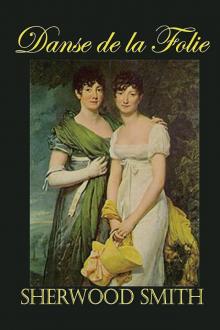 Danse De La Folie
Danse De La Folie King's Shield
King's Shield Whispered Magics
Whispered Magics Fleeing Peace
Fleeing Peace Barefoot Pirate
Barefoot Pirate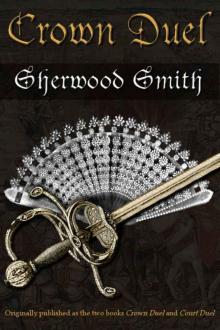 Crown Duel
Crown Duel Mearsies Heili Bounces Back
Mearsies Heili Bounces Back Commando Bats
Commando Bats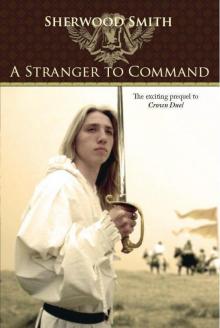 A Stranger to Command
A Stranger to Command Lhind the Spy
Lhind the Spy The Spy Princess
The Spy Princess Blood Spirits
Blood Spirits Sasharia en Garde
Sasharia en Garde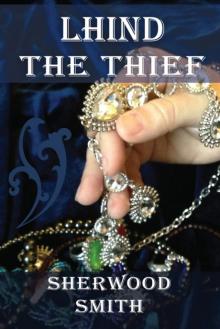 Lhind the Thief
Lhind the Thief Paradise Drift
Paradise Drift Banner of the Damned
Banner of the Damned The Trouble With Kings
The Trouble With Kings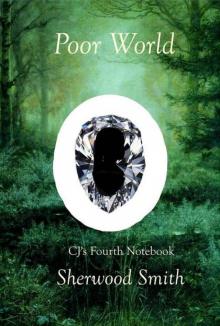 Poor World
Poor World Treason's Shore
Treason's Shore Wren Journeymage
Wren Journeymage A Posse of Princesses
A Posse of Princesses Revenant Eve
Revenant Eve Once a Princess
Once a Princess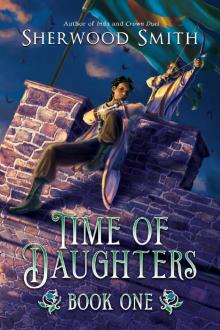 Time of Daughters I
Time of Daughters I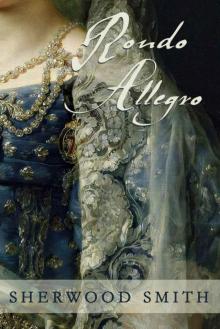 Rondo Allegro
Rondo Allegro Coronets and Steel
Coronets and Steel Over the Sea
Over the Sea Senrid
Senrid Hunt Across Worlds
Hunt Across Worlds A Sword Named Truth
A Sword Named Truth The Fox
The Fox Twice a Prince
Twice a Prince Fair Winds and Homeward Sail: Sophy Croft's Story
Fair Winds and Homeward Sail: Sophy Croft's Story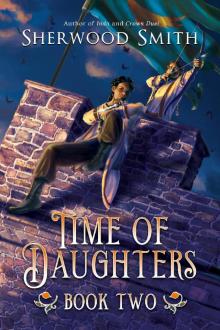 Time of Daughters II
Time of Daughters II The Rifter's Covenant
The Rifter's Covenant The Phoenix in Flight
The Phoenix in Flight Stranger
Stranger The Thrones of Kronos
The Thrones of Kronos A Prison Unsought
A Prison Unsought Twice a Prince: Sasharia En Garde Book 2
Twice a Prince: Sasharia En Garde Book 2